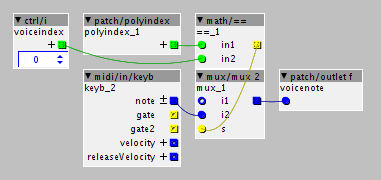I mentioned earlier that i thought i had got the thing working, but i still havent.
I just experiemnted further I would a like a numeric readout from the polyindex, just to see whats going on.
I guess there is something fundamental i dont understand still.. If i make a poly subpatch and i want to view the value that is being triggered/sent out by the polyindex, i dont know what to do.
I make an integer outlet inside the poly subpatch and connect the polyindex to the integer outlet. Outside the patch i then connect a disp/integer, to the integer outlet and i only get the number 6 all the time. This is with poly set to 4. If it set to 2 then the integer out value is 1.
This is by using your pitest by the way:)
Yeah i know im asking a lot of questions, but i just cant seem to get 4xmono synths playing as a polysynth. And still (as i asked in my latest post), maybe there is a way to only have one polyphonic voice, but still acces certain randomization parameters.
And i just saw Johannes fixed the bug he mentioned above. THANKS! but is there another "manual" way to do poly scanning? Something like this: Each gate adds a +1 to a counter. When 4 has been reached it should start over counting.
The counter should control a 4 way switch. The switch should behave like this: if counter=1, go to position/switch 1. If counter=2, go to position/switch 2.
The switch should have the midi signal connected on its input side, and the oscillator pitch on the other side.
Then you could have a duplicate of that arrangement, but just control the gate signal instead, and then you would have a working solution. Right?
Thanks people!




